316: Inside COP: How to Build a COP
With just a few weeks to go until COP30 in Belém, we take listeners inside the high stakes and the complex mechanics of a climate summit: how they’re structured, who’s running the show, and what makes this one different.
About this episode
How do you build a COP? With just a few weeks to go until COP30 in Belém, we take listeners inside the high stakes and the complex mechanics of a climate summit: how they’re structured, who’s running the show, and what makes this one different.
Christiana Figueres, Tom Rivett-Carnac, Paul Dickinson and Fiona McRaith unpack how high-level climate conferences actually work, and explore the people and processes shaping this first Amazonian COP. And, with multilateralism under pressure, they ask what we should be looking out for in November, and what success in Belém might look like.
Joining the hosts is Thais Bilenky, Brazilian political journalist and new friend of the show, to give us the view from inside Brazil: Lula’s positioning on the global stage, domestic tensions between national and regional politics, the tricky symbolism of COP in the state of Pará, and what all this means for international climate negotiations.
Learn more:
🌍 Check out the official COP30 website
📊 Find out more about the NDCs (Nationally Determined Contributions) and see what countries have submitted this year, or dive into this NDC tracker from Climate Watch for some digestible analysis of where they leave us
🎤 Leave us your voice notes and questions for upcoming episodes on SpeakPipe
Follow us on social media for behind the scenes moments and to watch our videos:
Instagram @outrageoptimism
LinkedIn @outrageoptimism
And we want to hear from you! What do you want to hear more of in Inside COP? Get in touch with us. Get in touch with us via this form.
Producer: Ben Weaver-Hincks
Video Producer: Caitlin Hanrahan
Assistant Producer: Caillin McDaid
Assistant Producer: Eve Jones
Exec Producer: Ellie Clifford
Commissioning Editor: Sarah Thomas
With thanks to Groundswell and Global Optimism.
This is a Persephonica production for Global Optimism and is part of the Acast Creator Network.
Full Transcript
Transcript generated by AI. While we aim for accuracy, errors may still occur. Please refer to the episode’s audio for the definitive version
Tom Rivett-Carnac: [00:00:03] Hello and welcome to Outrage and Optimism. I'm Tom Rivett-carnac.Christiana Figueres: [00:00:06] I'm Christiana Figueres.
Paul Dickinson: [00:00:07] I'm Paul Dickinson.
Fiona McRaith: [00:00:08] And I'm Fiona McRaith.
Tom Rivett-Carnac: [00:00:09] This week we will be talking about cops, where they come from and what they mean, as well as doing a post-match analysis on the General Assembly meetings from New York. And we speak to Brazilian journalist Thais Bilenky. Thanks for being here. Hi friends. So nice to be back together today. We really missed you last week in New York. It's never the same without you two. Paul and Christiana and we're going to get into.
Christiana Figueres: [00:00:31] Is that serious or. We're just absolutely delighted that we weren't there.
Tom Rivett-Carnac: [00:00:35] You may be delighted, but actually, I have to say that I'm sure you looked at all of the analysis and, you know, governments are falling behind all that stuff. And of course, all of that's true. And we should get into all of that. But I have to say, and I'm curious to know whether PHE had the same response. There was quite a lot of energy in New York last week. It didn't feel like the sort of damp squib that I kind of stupidly assumed it might be. Actually, I felt a lot of people were moving forward and the energy was really there.
Fiona McRaith: [00:00:58] I totally agree. And I mean, again, we'll get into what we actually heard from governments on NDCs. But I think as a community, at a time when so much negativity and pessimism is permeating the power of coming together and being surrounded by so much energy. And I hope, listeners, you felt that as well, hearing live from us on the ground. It was booming in a time when when it often feels like you're just drowning.
Christiana Figueres: [00:01:21] Just to put some reality there in. In addition to impressions, the largest climate week ever by numbers of participation, that in itself already expresses where most people want to go.
Paul Dickinson: [00:01:36] I mean, we started under Obama and it was a very sort of positive environment, but my general experience of working with, so to say, non-state actors and corporations and all this kind of thing is at one level, I mean, clearly there's this whole scary US situation, but they need to come together at times of opposition more than ever. That's the most important time to get together and say, you know, we're not in Crazytown and to stand with each other. You know, Trump's super crazy speech at the UN, actually reality itself is, is being sort of challenged. And Climate Week is a place where people can sort of say, oh, the table is a table and the floor is the floor, and gravity is gravity. And that's a good thing.
Paul Dickinson: [00:02:15] It's a good thing because.
Tom Rivett-Carnac: [00:02:17] Gravity is a good thing. Paul's being very humble there. I actually remember when the very first Climate Week was launched, there were only three people on stage. One of them was Paul Dickinson. But he doesn't mention that because he's such a humble man.
Paul Dickinson: [00:02:26] Well, four actually, Steve Howard's idea, me representing basically nearly the global economy, ban Ki moon, who's from the UN and a chap called Michael Bloomberg who's very famous in New York especially.
Tom Rivett-Carnac: [00:02:36] I really hope that your business card says representing the global economy, because that's absolutely perfect. That's exactly what it should say. Stand atop the greatest.
Paul Dickinson: [00:02:43] So those are the yesterday's.
Tom Rivett-Carnac: [00:02:46] Christiana, we were very sad you weren't there. But as a sort of secret, raging introvert, I know that these things can sometimes be torture for you. So I'm happy for you that you didn't have to go.
Christiana Figueres: [00:02:54] Thank you.
Tom Rivett-Carnac: [00:02:55] Now we should get into a response to the Nrdc's, because we just had that little snippet and sort of off the cuff reaction that I gave at the end of last week's episode, because of course, we'd recorded before the Secretary General's summit. But let's get into that just before the break. And we wanted to start off this week. This is kind of our second getting into it Inside Cop episode, where we dive into really what's going to happen in Belgium. The structure of the agreements. And we thought it might be worthwhile just kind of bringing people with us a little bit because believe it or not, not everybody spends their lives surrounded by cop acronyms and details of the UNFCCC and the NDCs.
Tom Rivett-Carnac: [00:03:29] And the. Yeah, no, I know, I mean, surprising as it may seem, if you use this language in the supermarket, people may not understand what you're talking about. So maybe we should start at the beginning.
Christiana Figueres: [00:03:39] That sounds like such a Julie Andrews line.
Tom Rivett-Carnac: [00:03:42] Well, you can sing if you like, but the question.
Tom Rivett-Carnac: [00:03:44] Is no, no, no. Far away in Brazil.
Christiana Figueres: [00:03:48] At the very beginning.
Tom Rivett-Carnac: [00:03:50] That's the.
Christiana Figueres: [00:03:50] Line.
Tom Rivett-Carnac: [00:03:51] It's a very good place to start.
Tom Rivett-Carnac: [00:03:53] It's a very good place to start.
Tom Rivett-Carnac: [00:03:55] Where did cops come from? Because there was a time when there weren't cops. And I'm going to challenge you now to tell us the story quickly of where they came from.
Christiana Figueres: [00:04:03] Yeah. The challenge is that quickly. Yeah. So where do they come from? So the convention itself was adopted in Rio.
Tom Rivett-Carnac: [00:04:09] You're gonna have to stop you there. The convention. I'm not sure you're convention itself.
Tom Rivett-Carnac: [00:04:13] Thank you.
Christiana Figueres: [00:04:14] The United Nations Convention on Climate Change was one of the three multilateral agreements that came out of the 1992 Rio meeting, but that was only basically a multilateral agreement of all governments. We want to do something on climate change because it is a huge threat. Then you have to actually figure out, okay, so what is going to be done and what is the process to agree to? What is going to be done?
Paul Dickinson: [00:04:40] So tiny intervention Christiana, if you'll forgive me. So that was Rio in Brazil. So does this mean this cop is a home match? We call it in football. It's coming back to where it was born.
Tom Rivett-Carnac: [00:04:49] Climate's coming home.
Christiana Figueres: [00:04:50] Climate is coming. Yes. Very good observation. I mean, not exactly to Rio. It's going to Belem. But yes, it's coming to this home country. So there was a several year process to design what the cops ought to look like. The cops are the conferences of the parties that are the annual get together of national governments who meet around a not a physical table, but an imaginary table to discuss with each other what they have done and what they will continue to do. And so the process that was designed was originally to guide from a political and policy international policy perspective, the decarbonization of the global economy and the increase in adaptation and in finance to support the decarbonization. Now, the interesting thing is that here we are, 30 years after the first cop that occurred in Berlin. And what we're seeing in Brazil is an acceleration of a process that already started a few years ago, but that is now going to be incredibly evident. And that is the process of recognition that the agreements among national governments had their place in the first few decades of this process, but that now they are beginning to lose their defining purpose because that actually has been achieved. So they're not losing their defining purpose because they're a failure. They're losing their defining purpose because they achieved what they were meant to achieve. And so what the Brazilians have recognized, all to their credit, is that now we really need to push from, yes, continuing to have the multinational, multilateral lateral international attention to this space, but all eyes and ears should now slowly or rather quickly, be turning over to where the action is, where the implementation is.
Christiana Figueres: [00:07:06] So to anyone who goes to Brazil and goes like, so what is the big agreement that is going to come out here? There is none. So don't ask the wrong question. There is no big agreement here. Most things have already been agreed. Now it's about how is this getting implemented? That is the right question to go to Brazil with how is it getting implemented? What changes can we see on the ground? And that is why it is so important to differentiate. And we will use two terms here that will accompany us between the blue zone and the green zone. The blue zone physically on the ground is the zone where national governments come together and they do their international formal thing. The green zone is becoming more and more the center of attention, because that is where the so-called action agenda takes place, which is where civil society representatives, business, finance, cities, states, they all come together not to negotiate anything with each other, but to implement the negotiations and the agreements that have already taken place. So it's a very, very different feeling, certainly from ten years ago, the Paris Agreement, where we did need an overarching agreement. That is not what we have now. So as we approach Belém, let's go with the right question, which is where is the implementation? Who is participating at what speed and with what scale? Because that is the question that we will be answering over the next few months.
Tom Rivett-Carnac: [00:08:37] Okay, that was amazing. A tour de force explanation in a few minutes of the history of cops, where they've come from and where they will now go to. And I know for you and Paul will want to come in, but I have a question for you. I have been listening. Just because I'm strange like this to a whole range of podcasts about cop 30, I'm not going to name them, but all of them describe the action agenda that you're talking about as, quote unquote, a sideshow, side meetings, side deals, that this is not the quote unquote main event of what's happening. And so how do we shift the mindset from that, which is still the predominant mindset that this is about governments, with the action being a sideshow to what you're now saying. It needs to turn into where that action is the main event. And governments, I mean, may not say they're the sideshow, but it's the less consequential bit. It seems we might be stuck in a previous conceptual model of actually what happens at these cops. So one question, and either we can ask it now or it might even hang over this whole series, is how do we make that shift?
Christiana Figueres: [00:09:39] Yeah, I think that is the question that we will be grappling with. But just to tease it up, I think we may be victims of our own success because we did work very, very hard to get public attention in the media attention to the agreement. Right. And, and we were able to to mobilize that for Paris. And now we have to live in the new reality that we have substantially the agreements. And now the question is, how does it get implemented? You know, it's a little bit and sorry for speaking as a grandmother. It's a little bit during nine months when you're obsessed with, you know, the nine month pregnancy and you know, the health of the baby. And then everybody goes into obsession mode as you get to the birth. But then it's no longer about the birth. It's about how quickly does this child begin to become an independent child? How quickly does he she crawl, how quickly does he she walk, talk, etc.? We're in the walking and talking stage. We're in the pre toddler, maybe the toddler stage. We're Were not at birth. Let us be.
Tom Rivett-Carnac: [00:10:49] Grateful for analogy.
Christiana Figueres: [00:10:50] Let's be grateful for the birth. But we're now in toddler stage.
Tom Rivett-Carnac: [00:10:53] I remember coming home after our first child was born thinking, well, what the hell do we do now? We've been so focused on the birth, now we've got to look after a baby. I think that's partly where we've been. Paul? Fi?
Fiona McRaith: [00:11:00] Listeners, I am of a different generation than most of our co-hosts, so I was not there.
Tom Rivett-Carnac: [00:11:07] Such a gentle way to put it.
Tom Rivett-Carnac: [00:11:09] Yeah. I'm.
Paul Dickinson: [00:11:10] Which which way were you? Younger.
Tom Rivett-Carnac: [00:11:12] Oh, I see, I.
Paul Dickinson: [00:11:13] Got you, I got you. That's right.
Tom Rivett-Carnac: [00:11:14] Most of our co-host. Sorry.
Fiona McRaith: [00:11:18] All right. I was trying to be just delicate, kind of laying the table.
Paul Dickinson: [00:11:22] I'm just, like, dance across this minefield.
Christiana Figueres: [00:11:24] When I speak as a grandmother. You know, I don't think with me you need any delicacy. But carry on
Paul Dickinson: [00:11:30] Let me tell you about the dinosaurs. Fiona McGrath.
Fiona McRaith: [00:11:32] So, um, you know, I wasn't. I wasn't there in Rio in 92 or or at many other cops since. But I have learned so much from you.
Christiana Figueres: [00:11:41] But you were born.
Fiona McRaith: [00:11:42] I was born by the Paris cop.
Paul Dickinson: [00:11:45] Yes, Cristiana by Rio.
Fiona McRaith: [00:11:46] I was not born by Rio.
Tom Rivett-Carnac: [00:11:48] You were not born by Rio. Okay. No.
Fiona McRaith: [00:11:50] And we talked about this actually on a previous podcast that I joined where we were answering a listener question. And I think, Christiana, if I can maybe tee you up to clarify what you had said then, which is the outcome determined the form of the Cop. And we've achieved that with the Paris Agreement. And the Paris Agreement has now been negotiated in following cops in the ten years since Paris. Correct. So a lot of the the things that governments that parties this is the conference of parties of governments have already negotiated a lot of that. And we're now talking about implementation and tracking implementation. That's why NDCs, the nationally determined contributions are so important. And if I may flatter my co-hosts and many of the teams that surrounded them, that's why Paris is so brilliant, because every five years, countries parties came as part of the Paris Agreement. I'm looking at their faces and I'm nervous to, like, Describe this to the architect.
Christiana Figueres: [00:12:46] You're doing a great job.
Fiona McRaith: [00:12:48] Um, but these NDCs are ways to chart our progress on delivering the Paris Agreement. There's a five year increment. That's because that's a reasonable time frame to actually deliver on what you claim as a as a party, as a government, as a country to deliver. And we know that we are off track. Frankly, the real economy has always been off track from what the parties are saying. But there's been huge amounts of progress really until this year. And I know that we're going to talk about some of the things that came out of last week and Unga, where NDCs were submitted, but that is really why we're hearing about this green zone, why we're hearing about the real economy. Because it's one thing for for governments to say and to make commitments. It's another for it to start to happen on the ground. And those two things have been so separate. The two circles of the Venn diagrams are now increasingly Seemingly overlapping in our in our brains. But the reality is they've always overlapped on the ground, and it's cool to see that starting to come into play during these two very consequential weeks when the cops take place, typically in November, right around American Thanksgiving.
Paul Dickinson: [00:13:57] The policy collaboration concept I find incredibly exciting when everyone kind of gets together. I mean, this is a conference, right? So I was thinking to myself, what if there was like an economics conference, a big economics conference of all the finance ministers or something, and then people wouldn't say, well, economics isn't fixed. Why haven't you fixed economics? You know, it's a conference, right? But there are, you know, important things here. First of all, for example, I'll draw one out. The European Union is bringing forward the carbon border adjustment mechanism from 2026. That's going to really change the real economy. There'll be lots of momentum built up around that. Maybe it's true that to some extent people don't change their minds on a microphone, right. But it is also true that space is created in the platform of the Cop that allows negotiators to go back to their governments and allow more to happen faster. And I think finally, I'd say that the sort of mechanism of the cops is starting to come into force now. You know, the the national inventories are starting to be measured against the initial round of NDCs. And the whole mechanism of Paris is really starting to operationalize now. So I think we can be very positive that there's a lot going on. And that's kind of binary. Oh, emissions might still be rising or something. The cops have failed is a very, I think, simplistic way to look at the world coming together. And by the way, if there was a big world government with a head of the world government, it would be a different situation. But there isn't. There's the cop.
Christiana Figueres: [00:15:14] Although you have been a candidate for that for a long time.
Paul Dickinson: [00:15:18] Emergency committee Christiana. And we need someone to have supreme global executive authority with all the armed forces under their personal control. I'm willing to take that responsibility on. Yes.
Fiona McRaith: [00:15:28] Like twist my arm. I'll take over the world.
Paul Dickinson: [00:15:30] No, I mean, I'm really available.
Paul Dickinson: [00:15:32] I think I'd be very good at it. I'm younger than Churchill was when he became prime minister. But let's park me for a minute.
Tom Rivett-Carnac: [00:15:38] So this is all great. And I think this is positive that we're moving in this direction and that Paul's going to be world king and other things like that are obviously very positive. But I would just bring us back to the fact that, yes, it's true. We need to shift from from negotiations to implementation. Yes, it's true that actually there was good vibes and momentum last week in New York, and we are staring down the barrel of a situation where governments are making a new round of commitments that are not closing the gap to 1.5, and they're not closing the gap decisively. Right. As we've said many times, winning slowly is the same as losing on climate. And if you leave it long enough, then you lose. You know, there's such a thing as being too late. You can get to the point where if your ambition doesn't arrive and it doesn't arrive and it doesn't arrive, and then you're like, well, the moment has passed and you look at the national commitments that we've had insufficient from China, nothing as yet from the EU, although we trust it's coming. Nothing coming from the US, a range of others. There's just no way that governments are going to solve this problem. And I think we can almost we've kind of always known that that this is a partnership with the real economy. But we saw that decisively last week. So that is a big moment that government democratic systems are not able to solve this problem. They need all of this. So that's quite a big thing to have happened.
Christiana Figueres: [00:16:58] It is. But Tom, I'm just going to push that one level further. No one can guarantee that we're going to solve this problem, because that's the verb that you used. Not even the best efforts right now, which we don't have on the table, will solve climate change. And I think that is something that we have to understand, because the degree of disruption that is already baked into the system is such that we have to face a changed, not a changing, a changed world, no matter what. The only thing that we're doing to be very, very honest here, and I think we have to swallow this pill. The only thing that we're doing is trying our best to avert the worst scenarios. That is the exercise that we're all participating in. Now to your point. Yes, governments are not the sum total of what governments are saying that they have done, and especially what they will do over the next ten years is pathetically insufficient. Now, China has always under promised and over delivered, and they took that tradition to the next level this time because.
Tom Rivett-Carnac: [00:18:15] John Podesta said they turned it into an art form. Yes, yes.
Christiana Figueres: [00:18:22] And it's understandable that they would react like that, given what they're seeing coming from the United States. Now other countries absolutely insufficient. The sum total. And what is much more interesting conversation is what is the delta between that which countries are putting out publicly and that which is actually happening on the ground? Because as we know, there is so much more transformation and transition speed and scale occurring in the real economy that that is really what is going to pull this transformation and this transition forward. So it's much more interesting to explore that gray space that honestly, it's going to be very difficult to put a numerical metric on it. But let us over the next few months, explore that space, what is actually happening on the ground in the acknowledgement that that is not being expressed by governments?
Tom Rivett-Carnac: [00:19:23] I think that's a great point, Christiana, and I think that what you've encapsulated there is our hope for this process, right, is that actually we can find a way to continue to get there, even though some of the systems that we're never probably going to lead, but they've proved that they're not going to. So we need to not allow that to dampen our enthusiasm to keep moving now. Last week, as listeners will know, we talked to Anna Tony also. I was very happy to run a round table together with Tulio Andrade, who is the director of strategy for the Cop 30 presidency. He is a career diplomat. Prior to this role, he was leading the Brazilian negotiation team. He's a good friend and before we ran our round table, I had a quick word with him for the podcast. So let's have a listen to that. Tulio, we have less than 50 days, so we'll all be together in Belém. Even less. When you think about the World Leaders Summit, you're here in New York. This is one of the most critical weeks in the next few months to build the momentum for a successful cop. How are you feeling? What are the opportunities and what are the challenges?
Tulio Andrade: [00:20:21] Thank you. Tom. This is indeed a very important week for us and for Cop. And at the very beginning of this week, we feel that this is going to be a moment of inflection around the three priorities that we have been voicing and inviting the international community to rally around. The first one is about multilateralism and strengthening multilateralism, and we are going to have a major not only the UN General Assembly is opening today. President Lula just spoke to the Who.
Tom Rivett-Carnac: [00:20:49] Gave.
Tom Rivett-Carnac: [00:20:49] A remarkable address defending the rules based global order.
Tulio Andrade: [00:20:52] Thank you so much. And so co-op is about this moment of truth. So naturally we we are also going to have tomorrow this major summit around the NDCs. And it will be key for us to really have countries presenting NDCs as perhaps one of the most important demonstrations of commitment to multilateralism. But then we have also the second priority, which is about connecting the process to people. Right?
Tom Rivett-Carnac: [00:21:20] And because whatever happens tomorrow, it's not going to be enough to get us to 1.5. I can say that maybe you can't, but that's my impression.
Tulio Andrade: [00:21:27] Absolutely. I think that it's not about governments alone. It's about the private sector, but most importantly, how to give people their sense of agency back, right. And to steer energy at the same time that we really frame the climate agenda as an agenda for prosperity, for creating jobs and really reaching people where they are. And the third priority in which this week is going to be very important, too, is to accelerate the implementation of the Paris Agreement. And then, together with the UN secretary general teams and our different climate envoy, we are organising a series of ten solutions dialogues, high level dialogues that goes from energy transition to nature to digital public infrastructure, adaptation and finance. And they're all about this power of solutions. There are so many amazing solutions out there. And so New York is going to be this moment in which it's we're going to have some inflections on multilateralism, people, and also accelerated implementation.
Paul Dickinson: [00:22:36] You know, so many speeches from national leaders at the United Nations spoke about extreme weather. And, you know, let's not forget that that force is not going away. And so, you know, don't write off the government and political process in all different kinds of political systems. In the end, we're going to have to do this. And yeah, it is what it is.
Tom Rivett-Carnac: [00:22:53] Lethal heat is a phrase I heard repeated extremely regularly.
Tom Rivett-Carnac: [00:22:57] Oh, wow.
Tom Rivett-Carnac: [00:22:57] During last week, I have to say, this little crew of Tullio Anna, as well as Andre del Lago, who's the cop president. It's just a sort of joyful little team of brilliant individuals who are coming together to do an enormous amount to get us to where we need to go. I think they're all amazing people, and they're really beginning to focus now, of course, on the national commitments and trying to get that ambition as robust as it can be, but a whole range of other factors as well, both inside the negotiation in the political package that will be released as part of the heads of state, and also, as we've mentioned before on this podcast, of course, the all important action agenda where the implementation is really happening. Load More
Tom Rivett-Carnac: [00:24:08] So, Christiana, every year, of course, the Cop is hosted in a different country, and that country provides what we call a presidency team. And that team changes every year as the cop moves country. But there is a permanent team, the UN climate change team, who stay with the process and help every presidency. Tell us a little bit about that dynamic and how that works between those different teams?
Christiana Figueres: [00:24:30] Yes, a very good question. And sometimes the relationship between those two teams is excellent and sometimes.
Tom Rivett-Carnac: [00:24:36] It's.
Christiana Figueres: [00:24:36] Not. Um, and I would say the chances of.
Tom Rivett-Carnac: [00:24:39] Success of specific examples.
Christiana Figueres: [00:24:41] Well no no no no no no, we don't we don't want to go all the way back to Copenhagen, for example.
Tom Rivett-Carnac: [00:24:45] Okay.
Christiana Figueres: [00:24:46] Um, but the chances of success of a cop really rely in great measure in the harmonious relationship between those two teams. So the Secretariat is a team of approximately 500 people headquartered these days in Bonn. And they are basically the continuity. They are the ones who hold the continuity all the way from before cop one all the way to now. They have the long view of where this ought to be going. They have the whole history of every single word, of every single comma, of every single negotiating body, of which we only have three this time. But sometimes we have many other negotiating bodies that are basically platforms for negotiating. So they hold all of that history. They are people who are specialized in the different topics in mitigation and adaptation and finance and capacity building, but also in the history of all of these legal texts. So they hold the continuity. They're also very much responsible for a lot of the logistics and the assignment of who uses which room, when and the creation of the text and getting it out to all negotiators. And for the legal, there's a very, very powerful, very capable legal department that checks every single sentence to make sure that it is in accord with all of the other legal texts that have been agreed, because they it is it's a it's a difficult thing to always come together and put texts together that do not contradict previous things.
Christiana Figueres: [00:26:21] So that is the secretariat that you and I worked for way back when in the lead up to Paris, Tom. Then there is the roving cop presidency, which changes every single year. Usually the Cop presidency is the same country as the host country. It's not always like that. We've had a few exceptions when that country cannot host. But usually, as a rule of thumb, the Cop presidency is a much more political diplomatic effort that is in constant communication with the government representatives and really holds the political tapestry, if you will, the political tapestry that needs to be woven in order to find, in the end, a legal text that everybody can agree to. And that is a one year responsibility. And then they turn it over to the next Cop presidency.
Tom Rivett-Carnac: [00:27:20] Okay, that's really helpful. And I mean, so I suppose an example people would understand is like, you know, in football or soccer to people listening. In the US, FIFA is the world's governing body, but then the World Cup is hosted by different countries or athletics. The Olympics is the governing body and then different countries will host it.
Christiana Figueres: [00:27:37] Very nice.
Tom Rivett-Carnac: [00:27:38] But I do have one question for you.
Tom Rivett-Carnac: [00:27:39] Oh, no.
Tom Rivett-Carnac: [00:27:40] Why does why does the presidency of a country start at their cop and then continue for the year after their presidency, rather than start a year before their cop?
Christiana Figueres: [00:27:52] Well, that would make so much more sense. Uh, I totally admit it's just a quirkiness that when the cop is convened, that is the moment in which the Cop president for that term is then officially accepted by everyone and instated as the Cop president, and then stays sort of as the past president when the next Cop president is announced. But the political work of the Cop presidency, the see the president and his team is definitely during the whole year before they assume before the.
Tom Rivett-Carnac: [00:28:30] Which makes it a strange formal.
Tom Rivett-Carnac: [00:28:31] Arrangement, which is sort.
Christiana Figueres: [00:28:32] Of strange, but it also invites Cop presidencies to work with each other and usually the Cop president that was past works with the incoming one in somewhat of a collaborative fashion, which is what we're seeing this year.
Tom Rivett-Carnac: [00:28:47] Great. So here's Ana Toni. She is the CEO of the cop. We actually got a few more minutes with her last week that we didn't share on that podcast. So let's have a listen to that now. So as you said, 48 days to go. The position you are in is one of incredible responsibility for a process that is vital for the future of humanity. Success is not guaranteed. There are many headwinds. How are you?
Ana Toni: [00:29:11] I mean, first I'm fine. Good.
Tom Rivett-Carnac: [00:29:13] We need.
Tom Rivett-Carnac: [00:29:13] You. Fine.
Ana Toni: [00:29:14] Yes, I am fine. And I am normally a half full person. I'm really optimistic, but I'm fine for one important the reason we have a great team under the Cop 30 presidency. We have amazing envoys. We have people helping us in our councils, in the circles. So there is an extended group of people. We have people like you and support from others. So we don't feel lonely. We feel there is a shared responsibility, obviously, with André and others. So we feeling that people have a lot of expectation. And the other day I went, they invited me to talk in a congress of psychoanalysts, and they were telling me that many of the people feeling sad and young people feeling, oh, they don't want to have kids because of climate, but at the same time, people feeling that you can only fight for something that you desire. And I really believe that people desire to continue living in a planet together. And I think if we are able to, to make Cop 30 and all the other cops that place that we can sit together and all our envoys and council and the team. I think we have that shared responsibility of making a planet that's good for everybody. I think that makes me feel in very good company. So I'm feeling good, a bit tired, but probably we'll know we'll be able to sleep in, God knows, 50 something days. Then I probably going to sleep for about a whole week.
Tom Rivett-Carnac: [00:31:02] You deserve it. Well, I mean, and so that's that's an amazing comment. And I have to say, when I've seen you and Andre and Tullio, the three of.
Tom Rivett-Carnac: [00:31:08] You.
Tom Rivett-Carnac: [00:31:09] You seem to be having a good time. And I'm really glad for that. You need that because it gives you the energy.
Ana Toni: [00:31:13] And we can only do our best, all of us. And I really feel with friends like you, Christiana and the team and the envoys. Everybody is doing their best and. But we need just to continue it. People should not give up because together we can change. We have done that before. Let us do it again.
Tom Rivett-Carnac: [00:31:33] Amazing.
Christiana Figueres: [00:31:34] It's important to recognize that Anna Tony does not come from the government sector. She comes from the civil society sector. She was in the NGO in the activist area before she was pulled in to do this. So again, the Brazilians trying to reach here across dividing lines to have someone like Andre Delago, who is the consummate multilateral diplomat, with Anthony, who is the consummate activist and NGO representative, and pulling them both into the presidency, absolutely brilliant.
Tom Rivett-Carnac: [00:32:09] And I guess that's comparable in some ways to going back to our day to Laurence Tubiana, who was not a member of the government but was brought in from outside, and Laurent Fabius, former foreign minister. Absolutely fantastic. All right. Well so lovely to see you Fay and Paul. I think sadly we're losing you now and we're going to take a quick break and we'll be back with some analysis from our amazing friend, Brazilian journalist Thais Bilenky, who will help us understand how the cop is being perceived domestically in Brazil, and much more. See you in a minute.
Tom Rivett-Carnac: [00:32:37] Bye bye.
Tom Rivett-Carnac: [00:32:41] Welcome back listeners. So we have a fantastic opportunity. The second half of this episode we are joined by Thais Bilenky, who is a brilliant Brazilian journalist who is a good friend of ours, and she's going to be with us not only today but regularly throughout this Inside Cop series to help us understand a bit more about the domestic political context in Brazil and what is being faced by the government and the people there as we come up against the Cop. 30 so first of all, thank you. Thank you, and.
Tom Rivett-Carnac: [00:33:08] Welcome to we're so.
Christiana Figueres: [00:33:10] Excited to have you.
Thais Bilenky: [00:33:11] Thank you Christiana. Thank you Tom. I'm excited too. And I'm really looking forward to have fun with you here.
Tom Rivett-Carnac: [00:33:19] Absolutely.
Tom Rivett-Carnac: [00:33:20] Now, I'd love to just start. I was in Brazil a couple of months ago, and I spent some time in Brazil the first time. I'd been there for many years and had this kind of crash course education and sort of know enough to be dangerous now about Brazilian politics. So looking forward to you helping in particularly two ways. One was some of the ministers in the government tried to explain to me just how complicated the coalition is in the Brazilian government at the moment, and how difficult it is to hold that together.
Thais Bilenky: [00:33:50] Only that you want me to tell, right?
Tom Rivett-Carnac: [00:33:52] Only that so.
Thais Bilenky: [00:33:53] Complicated.
Tom Rivett-Carnac: [00:33:54] You're gonna have to. It's probably.
Tom Rivett-Carnac: [00:33:55] A safe.
Tom Rivett-Carnac: [00:33:55] Assumption to think most people do.
Tom Rivett-Carnac: [00:33:58] Not understand.
Tom Rivett-Carnac: [00:33:59] Anything about this complicated.
Tom Rivett-Carnac: [00:34:01] Context, and so they don't see that when they look at the Cop presidency. So let's start there. How can you give us an introductory guide to the coalition in Brazil?
Thais Bilenky: [00:34:12] Okay. Let's go. Let's try to do it. Well, I think that it's better for us to begin with Lula, the president, because in some way he represents all the forces that he congregates in his government, in his coalition. So I think probably Marina Silva, the climate minister. Yeah, she embodies what she stands for. Absolutely. And this is not common in Brazilian politics. So she's a really unprecedent politician in Brazil. Everything in her is what she stands for. And this is totally, totally opposite to some other ministers Lula has in his government. So what I mean. I mean that we have people there that are fighting against Marina's agenda and in Congress as well. And Lula, his success is exactly to balance this interests his way to be the president of this continental country that is Brazil is to keep all these plates turning, you know. This is his recipe of making politics for so long in Brazil. And I would say that we should look to four key actors here to understand this moment in Brazilian politics. And, well, we have Lula. Of course, we have Marina Silva, we have Davi, and we have Helder Barbalho. Okay. So I'm going to tell you a little bit about the Columbia and Helder Barbalho, especially because Helder Barbalho is the governor of para.
Thais Bilenky: [00:36:02] Para is where Cup will be hosted. Is the state where Berlin is the capital. He is a very traditional politician and his father was a governor. His mother is a state congresswoman today, and his family is one of these symbols of what is the politics in Brazil? He represents the mainstream, the status quo. He represents the interests of big businessmen and business groups. He doesn't represent directly the indigenous and other communities in para, but he's the kind of politician that is used to when he needs to listen the indigenous. He will, and there will be always an opposition to him saying that it's not enough, you know? So he's like the traditional prototype of a politician in Brazil and Colombia is a senator. He's the president of the Senate. So in Brazil, this means he is the president of the Congress. And he comes from a little state in the north of the country called Amapa. And both Amapa and Para are very important now in Brazil. For one big matter, which is the government was doing the oil exploration auction in the Amazonas, which is the Amazon River mouth, to explore oil in the show that Colombia the president of the Congress, he's very much interested in exploring this oil in the shore of Amapa.
Tom Rivett-Carnac: [00:37:54] I mean, I wonder whether that tension there maybe exemplifies a tension that I don't know, you should tell us exists in Brazil around the desire for environmental integrity and the desire for jobs and growth.
Thais Bilenky: [00:38:11] I will use an image here. Lula gives one hand his left hand to Marina, Silva and Tony and people in Cop and all this climate agenda. And he gives the other hand to Yoko and other barbalho and, you know, a lot of powerful politicians in general. And they have like, opposite agendas. But Lula is trying to balance all these interests. And what I would say is that, you know, Lula himself is this tension, because when he gives his speech in the UN last week, just before Donald Trump, and he says we are committed with the NDC and with all the climate agenda, and we are investing $1 billion to protect our forests and everything, he said. He's saying the truth. I mean, this is what Brazil looks like to the world. It is what he's doing. But at the same time he is doing some other things and he himself, Lula, the president. He thinks that he needs to explore oil to get more jobs. So it's kind of a tension and I would say Brazil now is very much divided. So there we could say like half of the country is like seeing the world more or less like Fernando, Lula, Marina, maybe. And the other half is like just wanting to destroy the forest if it's needed to get more jobs and everything else. So it's a permanent tension. But there are some nuances as well. So we are navigating this ocean, turbulent ocean tides.
Christiana Figueres: [00:39:55] And just for our listeners who may not be aware of Marina Silva's trajectory, I think it's important to recognize. And I thought it was interesting that you said President Lula gives his left hand to Marina Silva. And you're absolutely right about that. Because Marina Silva has been in the past, she has been a presidential candidate for the Green Party. She's been a presidential candidate for the Socialist Party. She has been probably, if not the certainly one of Brazil's most distinguished environmental activist activists for human rights, for the rights of indigenous populations. And it's not surprising because of where she comes from. She is a descendant of rubber tappers on both sides, and she's a descendant of Portuguese immigrants and black African ancestors who were rubber tappers. And she herself has moved up in the political ladder in Brazil, but remains very, very loyal to her roots. So that just as a little bit background, so that listeners understand. When you say President Luna gives his left hand to this kind of thinking and his right hand to more traditional economic development thinking, and he is trying to do a very tough job of balancing both of these, both for his domestic positioning and for his re-election next year, by the way.
Thais Bilenky: [00:41:33] Definitely.
Christiana Figueres: [00:41:34] But also trying to figure out how to balance this for the cop. So a very difficult role that he has.
Thais Bilenky: [00:41:43] Yeah, yeah.
Thais Bilenky: [00:41:44] You got the essential points there Christiana. Because Marina, you know, she was she started like in Accra. She was born there actually that is maybe the most far state in Brazil's difficult to get there. It's difficult to, you know, meet people from Accra. I mean, it's it's far away from Sao Paulo, and she has this long and strong trajectory. And when she begins in the politics, she begins in the Workers Party, which is Lula's party. And she was a great ally of him in the beginning. She broke off from Lula, goes to another party to the Green Party, and she's the candidate. And it's a very turbulent moment for her. And then in 2022, the last election in Brazil, she reconciles with Lula because we were in a very a tremendous, dangerous election here. And everybody that were worried with the democracy in Brazil reconciliated with Lula and supported him. And I think it was well seen In and approved by her admirers and everything. So here's where we are now.
Tom Rivett-Carnac: [00:43:11] I know we don't have you for super long, so I just want to ask you a couple of questions about how the cop is manifesting in Brazil. I mean, I'd love to just hear just a quick anecdote of like, if I was in Sao Paulo or in Rio, or indeed anywhere in the country, and walking past a newsstand and seeing the headlines, how would I see the upcoming cop reported by the national press?
Thais Bilenky: [00:43:31] Yeah, Tom, you would see a lot of headlines about the hotels and the costs that delegations are and they aren't willing to pay to be billing. So this is the huge issue that we are discussing here is the logistics. There is a lot of criticism with the government because it's billing and billing is not Sao Paulo, Rio de Janeiro or Brasilia. It's it's not that easy for even two Brazilians to go to Berlin. It's not a traditional trip.
Christiana Figueres: [00:44:08] It's not a popular destination.
Thais Bilenky: [00:44:10] Yeah, it's not a.
Thais Bilenky: [00:44:11] Traditional trip you would do with your kids, you know, in the holidays. So. So people are like, why did you do that? But I see as well that people admire this because having the Amazon to host the cop and, you know, people from all over the world coming and seeing what it is. So I think there are mixed feelings, but it's easier to the Brazilian public in general to talk about the fees of the hotels and how expensive it is. It's easier that than, you know, talking about NDC.
Christiana Figueres: [00:44:50] Sure. Yeah. It's easier for anybody dies.
Tom Rivett-Carnac: [00:44:53] Yeah.
Christiana Figueres: [00:44:55] Thais, here's a question. The political decision to hold the cop in Belém. We know it's very symbolic because it is one of the entry points into the Amazon. So it's very symbolic choice. But from a domestic political re-election perspective, why did Lula think that that was important to him?
Thais Bilenky: [00:45:16] Yeah, good. Great question. Because I was introducing him to the audience because he's important to Lula, because Barbara's family, they are from this, the most traditional political party in Brazil. Imdb. Imdb. And this party is big. They are important because they will hold back the opposition in the next year's election, you know. So they have this importance. So he chose Para and Amazonas because of that.
Christiana Figueres: [00:45:54] Very interesting. Fascinating. So to everyone who thought that we were going only to an international event. That is clearly not the case. We're also right in the midst of domestic politics.
Thais Bilenky: [00:46:07] Totally.
Christiana Figueres: [00:46:08] Thank you. Thank you so much, guys, for for laying that out for us so clearly.
Thais Bilenky: [00:46:13] Good. My pleasure. Yes.
Tom Rivett-Carnac: [00:46:15] Thank you so much for explaining all of this. I think we're coming towards the end of the time that we have you for today, but we're looking forward to talking to you more in the coming weeks. The production team, who know far more about these things than I do, have told me. There's one question I need to ask you, and I don't even understand the question.
Thais Bilenky: [00:46:29] I know.
Tom Rivett-Carnac: [00:46:30] You.
Tom Rivett-Carnac: [00:46:30] Know what it is. So please can you explain to me what is meant by para inglés?
Thais Bilenky: [00:46:35] Yeah, your.
Thais Bilenky: [00:46:36] Pronunciation is pretty.
Thais Bilenky: [00:46:37] Good.
Thais Bilenky: [00:46:39] So, Tom, this expression is an idiomatic expression in Brazil that means literally it means for Englishmen to see. But more broadly, what it means is to put on a show for the foreigners. And yeah, the government is rushing Racing to build all the logistics and infrastructure to make it happen. That's true. I think that now in Brazil everybody is very skeptical. So, you know, people won't be like, yeah, we are having cop here. This is wonderful. This is perfect. And Brazil is a success. That's not the moment in Brazil. But I think that if things go well, I think that it might be a good memory in Brazilian collective mind. I am pretty optimist that some good contributions will last and benefit locals because it's needed.
Christiana Figueres: [00:47:44] Fantastic. Well, we will definitely do our best to contribute to that scenario for sure. And thank you so much, because we're definitely counting on you to to open these little understanding windows for us so that we can get deeper into the meaning of the Cop, both from its international perspective but also its domestic. So thank you so much for joining us today. We look forward to having you on as frequently as possible, as your busy schedule allows us and to ground us into Brazilian reality. Thank you so much guys.
Thais Bilenky: [00:48:21] Thank you.
Thais Bilenky: [00:48:21] Christina. Thank you Tom. I hope I can have fun with you guys here for sure.
Tom Rivett-Carnac: [00:48:26] Looking forward to it.
Tom Rivett-Carnac: [00:48:28] Okay, so that concludes our episode for this week. Huge thanks to tais for joining us. She'll be back in future with more analysis on what's happening in Brazil. And thanks to all of you for listening. This ongoing series of Insight Cop will continue over the coming weeks, the crucial few weeks that we have through to this negotiation in order to get us back on track to 1.5. So please continue to follow us. Send us your questions, follow us on social media. Until then, we'll see you next week.
Your hosts

Christiana Figueres
 Follow Christiana Figueres on Instagram
Follow Christiana Figueres on Instagram

Tom Rivett-Carnac
 Follow Tom Rivett-Carnac on Instagram
Follow Tom Rivett-Carnac on Instagram

Paul Dickinson
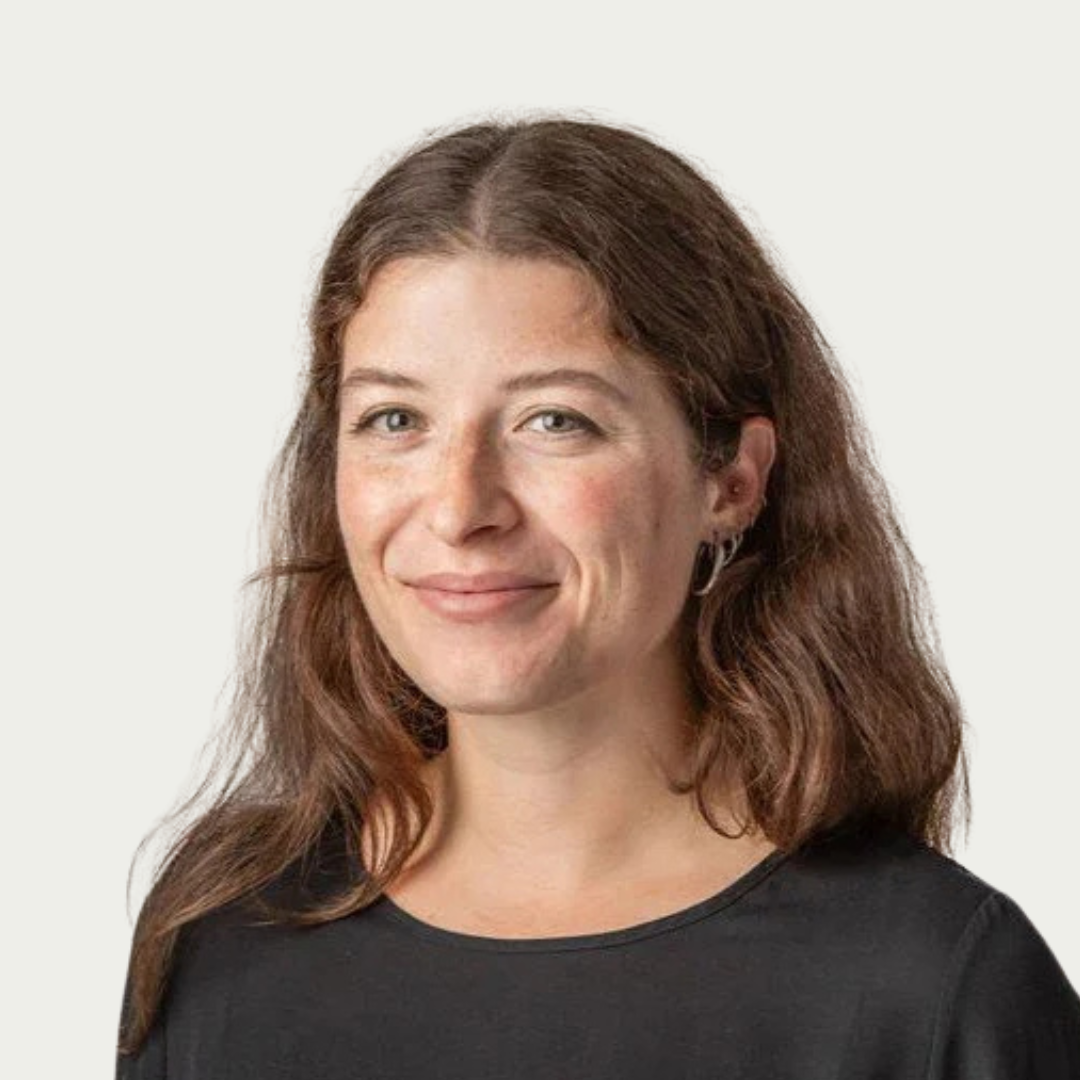

.png)
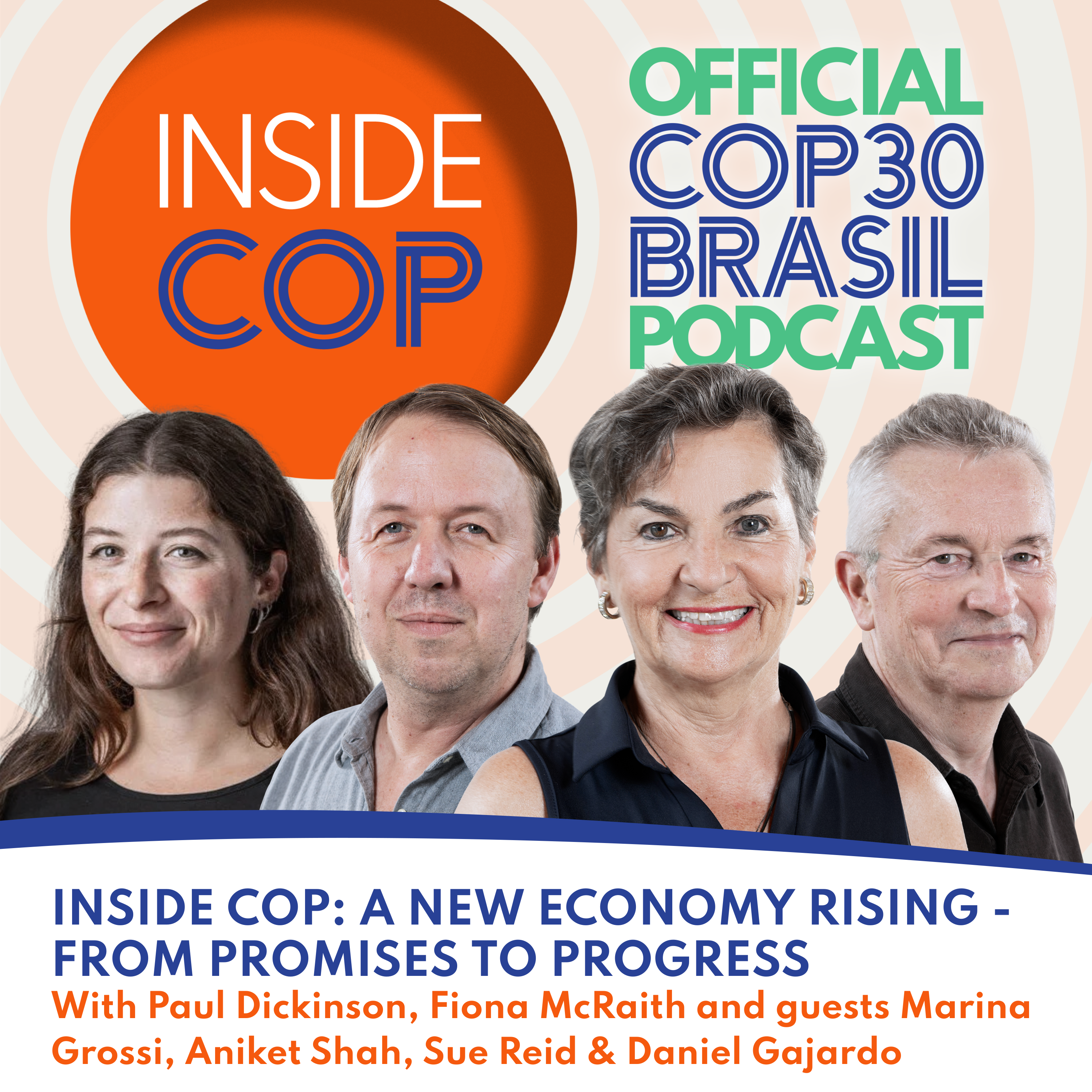
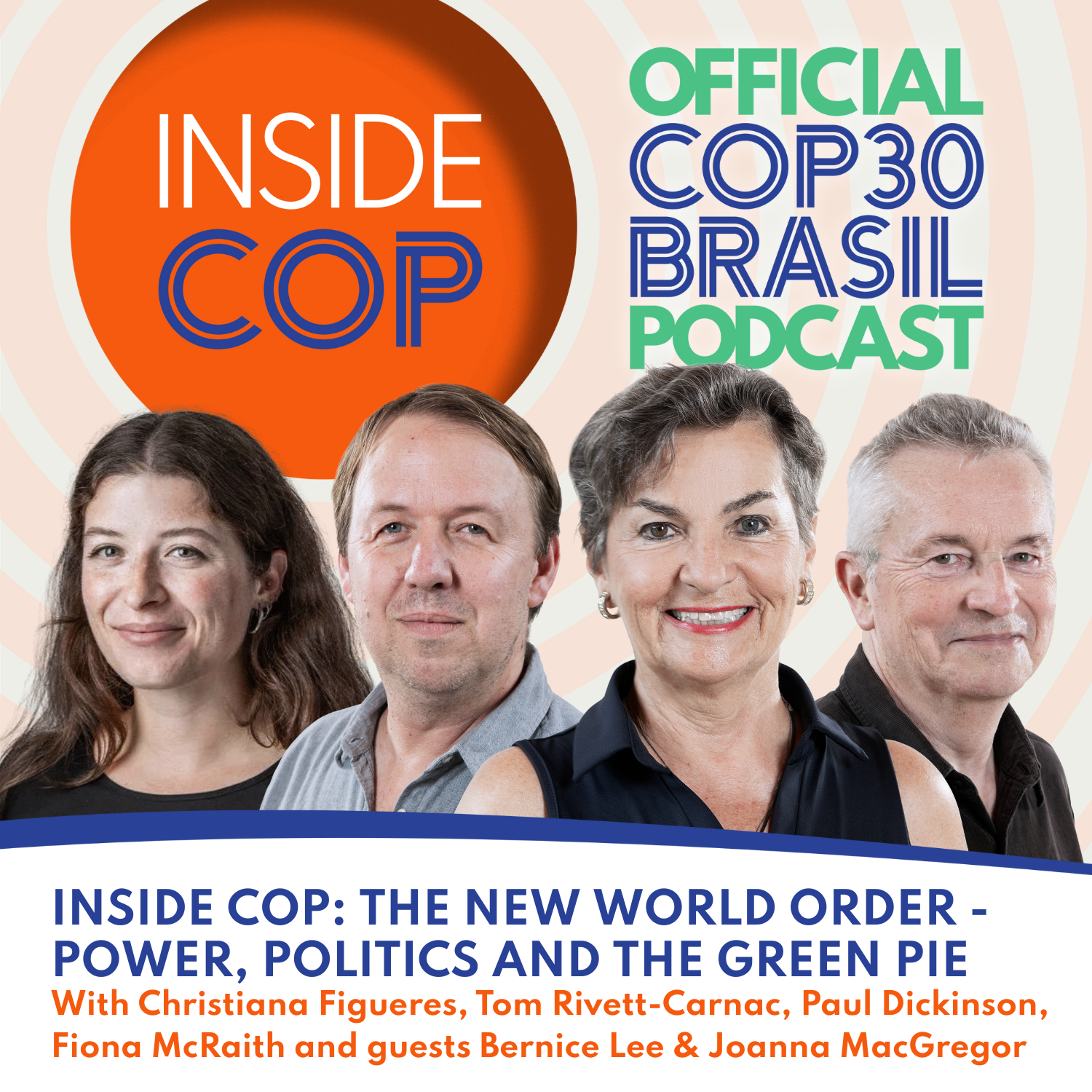
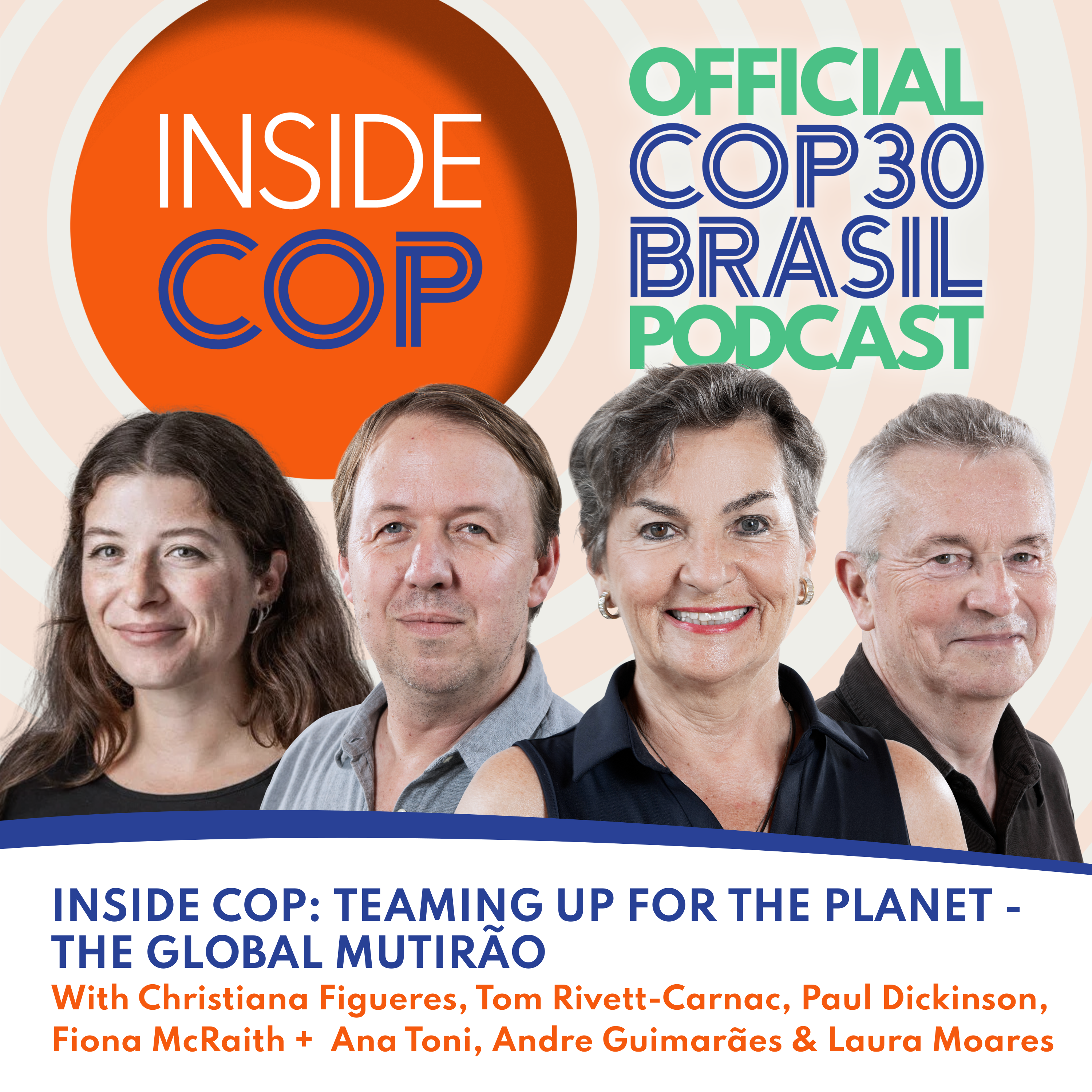
.png)
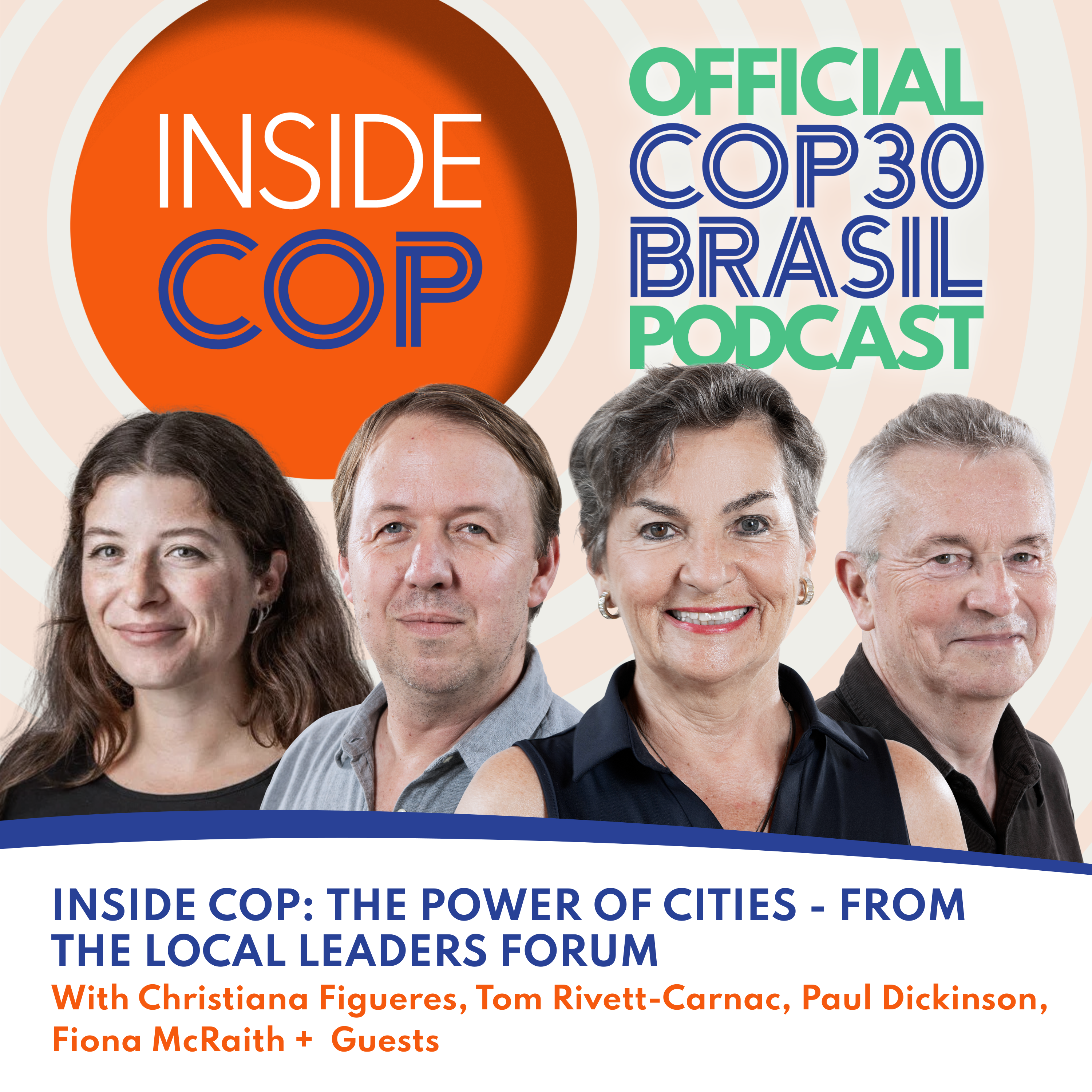
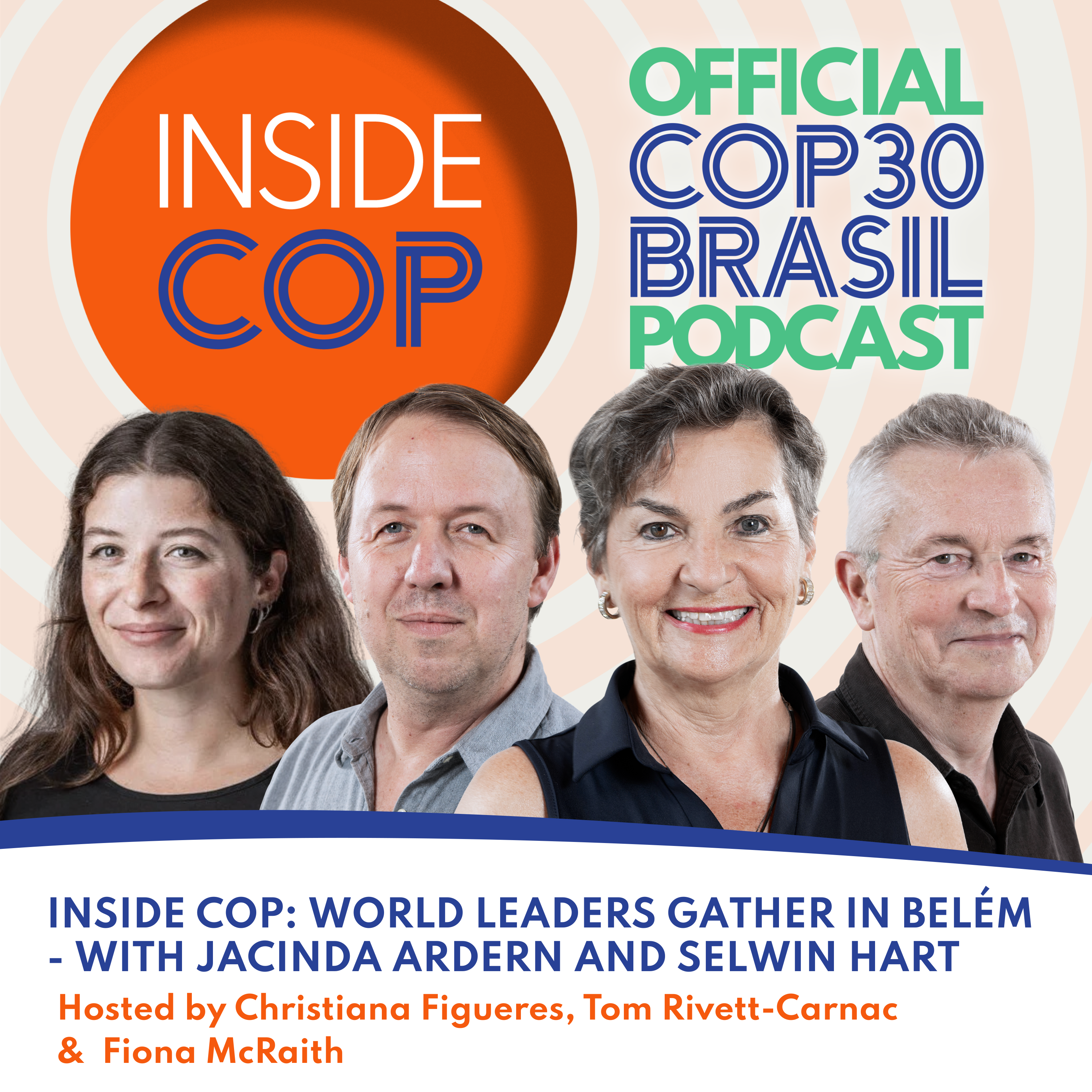
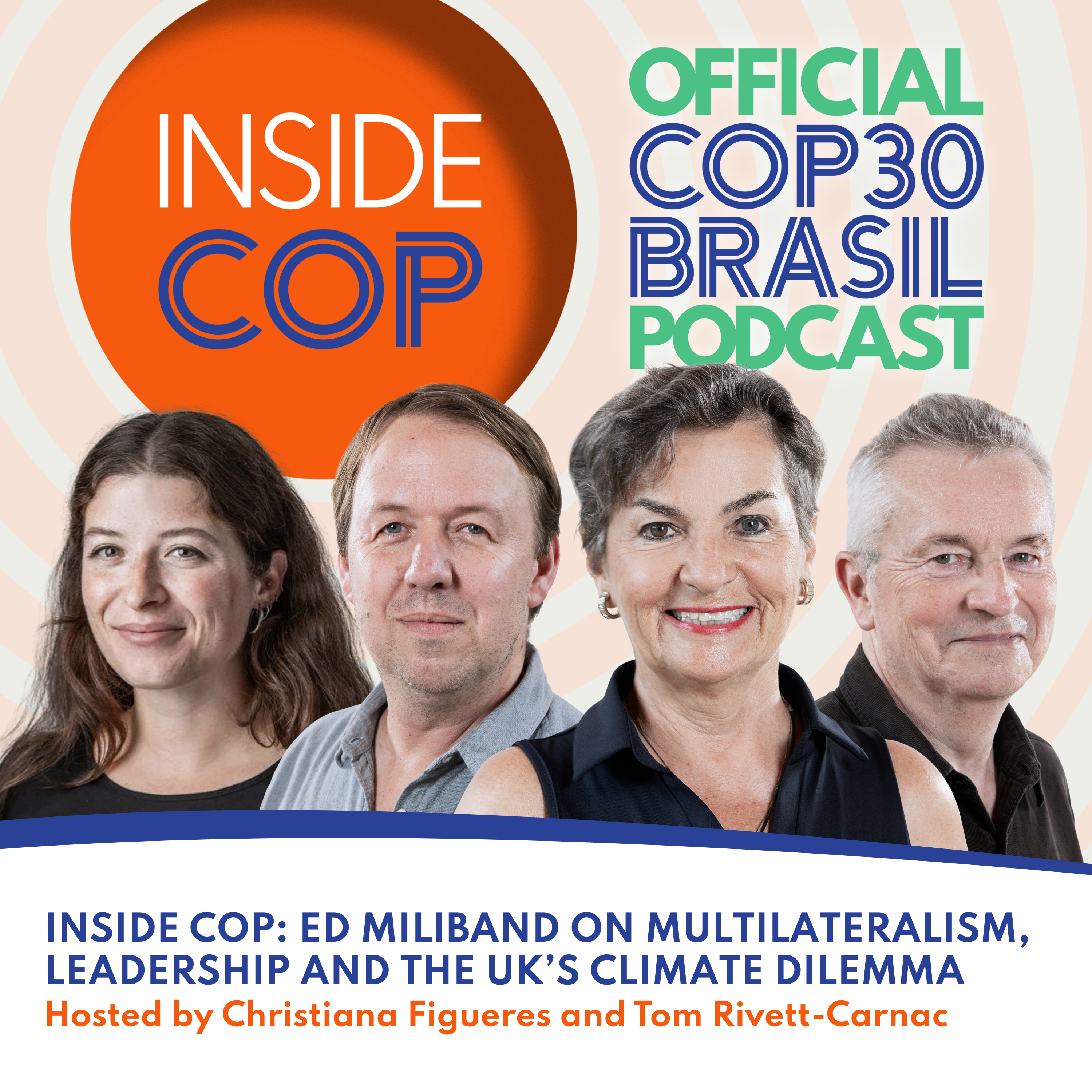
.png)
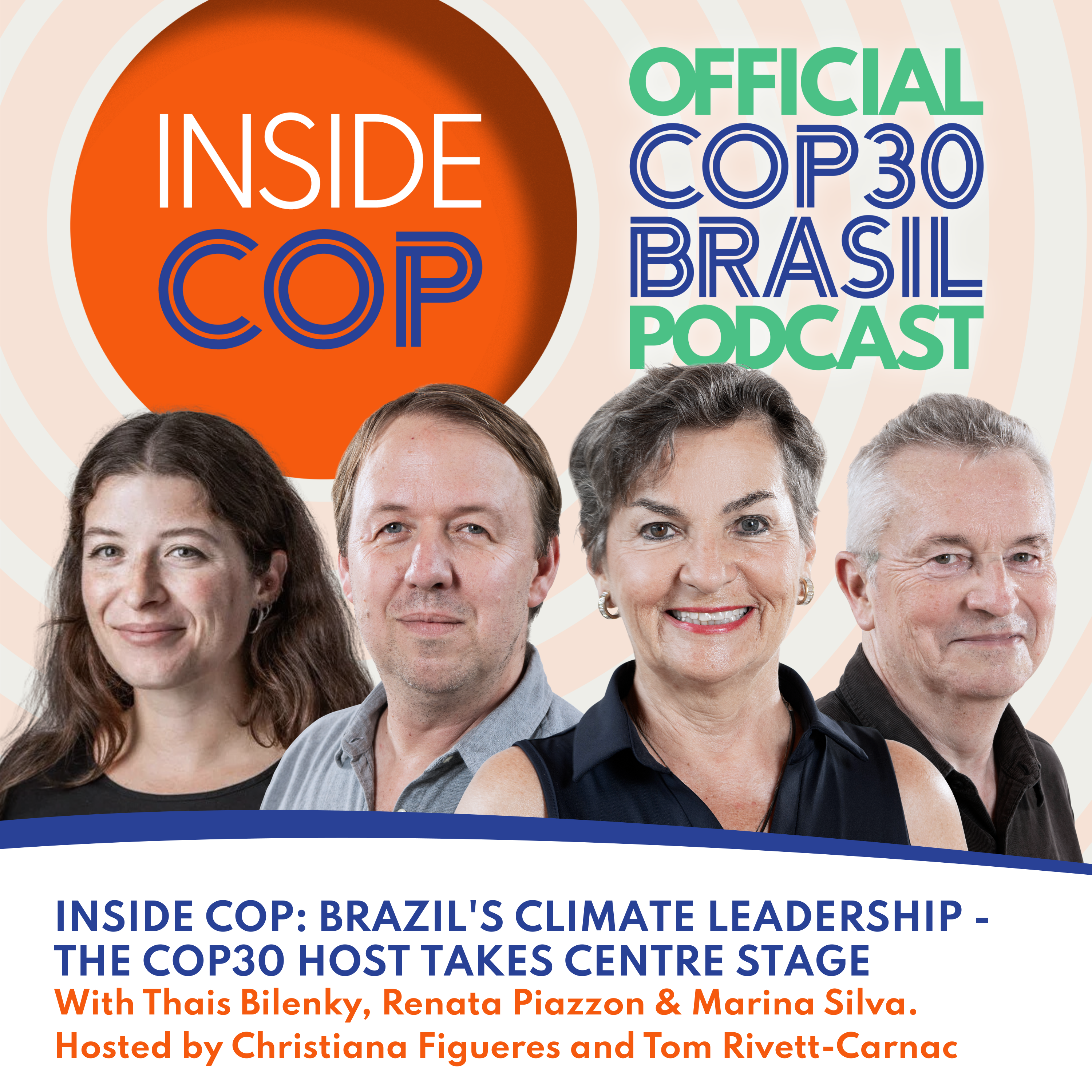
.png)
.png)
.png)
.png)
.png)
.png)
.png)
.png)
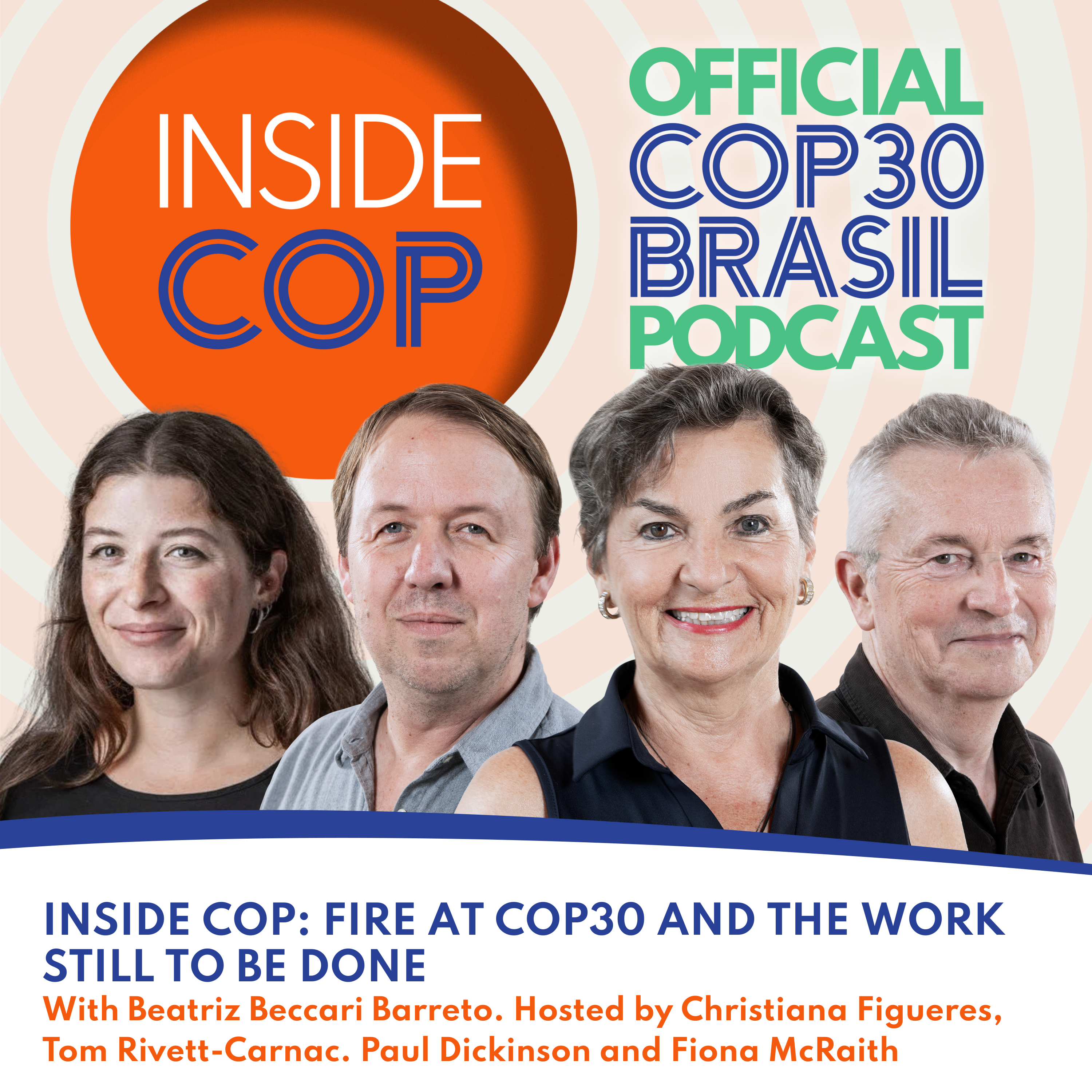

.png)
.png)







